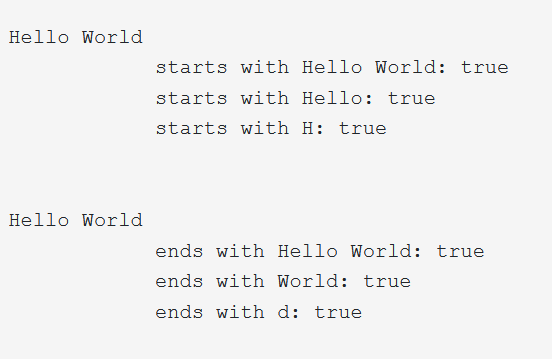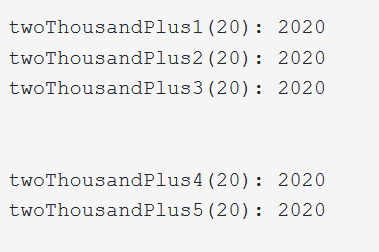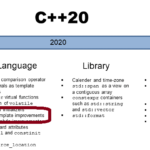More and More Utilities in C++20
Today, I present a few utilities for calculating the midpoint of two values, checking if a std::string starts or ends with a substring, and creating callables with std::bind_front. These little utilities may not seem so minor when you need them.

Let’s start with arithmetical.
Midpoint and Linear Interpolation
std::midpoint(a, b)calculates the midpoint(a + (b - a) / 2)of the integers, floating points, or pointers. If a and b are pointers, they must point to the same array object.std::lerp(a, b, t)calculates the linear interpolation (a + t( b – a)). When t is outside the range [0, 1], it calculates the linear extrapolation.
The following program applies both functions.
// midpointLerp.cpp #include <cmath> // std::lerp #include <numeric> // std::midpoint #include <iostream> int main() { std::cout << std::endl; std::cout << "std::midpoint(10, 20): " << std::midpoint(10, 20) << std::endl; std::cout << std::endl; for (auto v: {0.0, 0.1, 0.2, 0.3, 0.4, 0.5, 0.6, 0.7, 0.8, 0.9, 1.0}) { std::cout << "std::lerp(10, 20, " << v << "): " << std::lerp(10, 20, v) << std::endl; } }
The output of the program should be self-explanatory. If not, try it out on Compiler Explorer.
 Modernes C++ Mentoring
Modernes C++ Mentoring
Do you want to stay informed: Subscribe.
C++20 has convenience functions for creating arrays.
Creating Arrays and
With std::to_array, and std::make_shared, C++20 offers new ways to create a std::array or std::shared_ptr from C-arrays.
std::to_array
Thanks to std::to_array, creating a std::array from a C-array is a straightforward job.
// toArray.cpp #include <type_traits> #include <utility> #include <array> int main(){ auto arr1 = std::to_array("C-String Literal"); static_assert(arr1.size() == 17); // (1) auto arr2 = std::to_array({ 0, 2, 1, 3 }); // (2) static_assert(std::is_same<decltype(arr2), std::array<int, 4>>::value); auto arr3 = std::to_array<long>({ 0, 1, 3 }); // (3) static_assert(std::is_same<decltype(arr3), std::array<long, 3>>::value); auto arr4 = std::to_array<std::pair<int, float>>( { { 3, .0f }, { 4, .1f }, { 4, .1e23f } }); static_assert(arr4.size() == 3); // (4) static_assert(std::is_same<decltype(arr4), std::array<std::pair<int, float>, 3>>::value); }
The lines (1), (2), (3), and (3) assert that the created std::array has the expected type and size.
Per design, a std::array is as cheap and as fast as a C-array. If you want to know more about std::array, and why you should not use a C-array, read my post “std::array – Dynamic Memory, no Thanks“.
Additionally, a std::array knows its size and supports the typical interface of each container of the Standard Template Library, such as std::vector.
So far, all MSVC, Clang, GCC compilers support this convenient way to create a std::array. This observation does not hold for the next feature.
Create a std::shared_ptr of C-arrays
Since C++11, C++ has the factory function std::make_shared to create a std::shared_ptr. Since C++20, std::make_shared also supports the creation of std::shared_ptr of C-arrays.
auto s1 = std::make_shared<double[]>(1024); auto s2 = std::make_shared<double[]>(1024, 1.0);
s1 is a std::shared_ptr of a C-array. All members are default initialized. s2 is a std::shared_ptr of a C-array. Each element is initialized to 1.0.
In contrast, the new two new member functions of std::string are already available with a brand-new MSVC, Clang, or GCC compiler.
Check if a String starts with a Prefix or ends with a Suffix
std::string get a new member functions starts_with and ends_with which checks if a std::string start or ends with a specified substring
// stringStartsWithEndsWith.cpp #include <iostream> #include <string_view> #include <string> template <typename PrefixType> void startsWith(const std::string& str, PrefixType prefix) { std::cout << " starts with " << prefix << ": " << str.starts_with(prefix) << '\n'; // (1) } template <typename SuffixType> void endsWith(const std::string& str, SuffixType suffix) { std::cout << " ends with " << suffix << ": " << str.ends_with(suffix) << '\n'; } int main() { std::cout << std::endl; std::cout << std::boolalpha; std::string helloWorld("Hello World"); std::cout << helloWorld << std::endl; startsWith(helloWorld, helloWorld); // (2) startsWith(helloWorld, std::string_view("Hello")); // (3) startsWith(helloWorld, 'H'); // (4) std::cout << "\n\n"; std::cout << helloWorld << std::endl; endsWith(helloWorld, helloWorld); endsWith(helloWorld, std::string_view("World")); endsWith(helloWorld, 'd'); }
Both member functions starts_with end ends_with are predicates. This means they return a boolean. You can invoke the member function starts_with (line 1) with a std::string (line 2), a std::string_view (line 3), and a char (line 4).

The following utility function in C++20 may wonder you.
std::bind_front
std::bind_front (Func&& func, Args&& ... args) creates a callable wrapper for a callable func. std::bind_front that can have an arbitrary number of arguments and binds its arguments to the front.
Now, to the part which may wonder you. Since C++11, we have std::bind and lambda expression. To be pedantic std::bind is available since Technical Report 1 (TR1). Both can be used as a replacement of std::bind_front. Furthermore, std::bind_front seems like the minor sister of std::bind, because std::bind only supports the rearranging of arguments. Of course, there is a reason in the future to use std::bind_front: std::bind_front propagates exception specification of the underlying call operator.
The following program exemplifies that you can replace std::bind_front with std::bind, or lambda expressions.
// bindFront.cpp #include <functional> #include <iostream> int plusFunction(int a, int b) { return a + b; } auto plusLambda = [](int a, int b) { return a + b; }; int main() { std::cout << std::endl; auto twoThousandPlus1 = std::bind_front(plusFunction, 2000); // (1) std::cout << "twoThousandPlus1(20): " << twoThousandPlus1(20) << std::endl; auto twoThousandPlus2 = std::bind_front(plusLambda, 2000); // (2) std::cout << "twoThousandPlus2(20): " << twoThousandPlus2(20) << std::endl; auto twoThousandPlus3 = std::bind_front(std::plus<int>(), 2000); // (3) std::cout << "twoThousandPlus3(20): " << twoThousandPlus3(20) << std::endl; std::cout << "\n\n"; using namespace std::placeholders; auto twoThousandPlus4 = std::bind(plusFunction, 2000, _1); // (4) std::cout << "twoThousandPlus4(20): " << twoThousandPlus4(20) << std::endl; auto twoThousandPlus5 = [](int b) { return plusLambda(2000, b); }; // (5) std::cout << "twoThousandPlus5(20): " << twoThousandPlus5(20) << std::endl; std::cout << std::endl; }
Each call (lines 1 – 5) gets a callable taking two arguments and returns a callable taking only one argument because the first argument is bound to 2000. The callable is a function (1), a lambda expression (2), and a predefined function object (line 3). _1 is a so-called placeholder (line 4) and stands for the missing argument. With lambda expression (line 5), you can directly apply one argument and provide an argument b for the missing parameter. From the readability perspective, std::bind_front is easier to read than std::bind, or the lambda expression.

If you want to play with the example, use Compiler Explorer.
What’s next?
In my next post to C++20, I present the extensions of the chrono library: time of day, a calendar, and time zones.
Thanks a lot to my Patreon Supporters: Matt Braun, Roman Postanciuc, Tobias Zindl, G Prvulovic, Reinhold Dröge, Abernitzke, Frank Grimm, Sakib, Broeserl, António Pina, Sergey Agafyin, Андрей Бурмистров, Jake, GS, Lawton Shoemake, Jozo Leko, John Breland, Venkat Nandam, Jose Francisco, Douglas Tinkham, Kuchlong Kuchlong, Robert Blanch, Truels Wissneth, Mario Luoni, Friedrich Huber, lennonli, Pramod Tikare Muralidhara, Peter Ware, Daniel Hufschläger, Alessandro Pezzato, Bob Perry, Satish Vangipuram, Andi Ireland, Richard Ohnemus, Michael Dunsky, Leo Goodstadt, John Wiederhirn, Yacob Cohen-Arazi, Florian Tischler, Robin Furness, Michael Young, Holger Detering, Bernd Mühlhaus, Stephen Kelley, Kyle Dean, Tusar Palauri, Juan Dent, George Liao, Daniel Ceperley, Jon T Hess, Stephen Totten, Wolfgang Fütterer, Matthias Grün, Ben Atakora, Ann Shatoff, Rob North, Bhavith C Achar, Marco Parri Empoli, Philipp Lenk, Charles-Jianye Chen, Keith Jeffery, Matt Godbolt, Honey Sukesan, bruce_lee_wayne, Silviu Ardelean, schnapper79, Seeker, and Sundareswaran Senthilvel.
Thanks, in particular, to Jon Hess, Lakshman, Christian Wittenhorst, Sherhy Pyton, Dendi Suhubdy, Sudhakar Belagurusamy, Richard Sargeant, Rusty Fleming, John Nebel, Mipko, Alicja Kaminska, Slavko Radman, and David Poole.
| My special thanks to Embarcadero |  |
| My special thanks to PVS-Studio |  |
| My special thanks to Tipi.build |  |
| My special thanks to Take Up Code |  |
| My special thanks to SHAVEDYAKS |  |
Modernes C++ GmbH
Modernes C++ Mentoring (English)
Rainer Grimm
Yalovastraße 20
72108 Rottenburg
Mail: schulung@ModernesCpp.de
Mentoring: www.ModernesCpp.org



Leave a Reply
Want to join the discussion?Feel free to contribute!